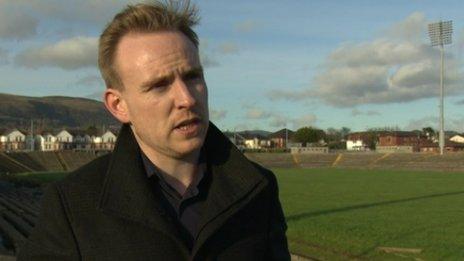Casement Park: GAA 'could have engaged better'
- Published
"Perhaps there's things we could have done a lot better in terms of engaging with the residents"
A leading GAA official has admitted they could have done more to engage with residents opposed to the building of a major new stadium in west Belfast.
It is understood the organisation now believes it will have to offer to buy some homes next to the Casement Park development.
Residents are threatening legal action to stop the 38,000-seater stadium that got planning permission before Christmas.
Ryan Feeney, Head of Public Affairs of the Ulster Council of the GAA, says he "deeply regrets" the fact that some of those opposed to the project are members of the organisation.
In an interview for The View on BBC One, he said "There's things you can always do differently and better, and I'd be the first to hold my hands up and say perhaps there's things we could have done a lot better in terms of engaging with the residents.
"I lead that process and I take responsibility for that."

The GAA plans to build a 38,000-seater stadium in west Belfast
Residents say the organisation has treated them badly and ignored their concerns.
But Mr Feeney said the GAA has been "transparent and open" in everything it has done.
"We've been engaging with the residents for 18 months, we've given them four designs for the stadium; we've knocked 300 doors; we've had a three-week consultation process with a scale model.
"We went above and beyond what we had to do in the consultation process because it was the right thing to do.
"It is a matter of deep regret that we find ourselves in a situation where we have members of the GAA who live locally who are opposed to this project, and I want to appeal to them to get round the table, discuss issues with us and I will assure them the GAA will do its best to alleviate their concerns."

Ryan Feeney said the GAA should have engaged better with residents
Asked what he would have done differently, Mr Feeney said: "Well what I would have done differently in terms of the engagement process, I would have ensured that we would have spread the net wider in terms of engaging with the residents.
"I would also have ensured that on a weekly basis they were getting updates directly from the GAA instead of meeting smaller groups and giving them information so that they were getting direct information from us that might have alleviated some of the misinformation that was put out about the project and that currently exists."
The residents are currently considering whether its worth seeking a judicial review, which at the very least could hold up the project that the GAA hopes to complete in 2016.
I understand the organisation is now actively considering offering to buy a small number of houses closest to the stadium.
One of those who may be affected, Yvonne Mulligan, says she and her husband would give any such offer serious consideration because they do not think they could continue living in their current home once the stadium is built.
"We live in very close proximity to it, and it is going to have a major detrimental impact on us," she says.
"People's health is suffering, people are depressed, they're anxious; they can't sleep at night. It just consumes your life."
The View is on BBC One Northern Ireland at 22:35 GMT on 6 February.
- Published25 January 2014
- Published10 January 2014
- Published19 November 2013
- Published12 September 2013
- Published21 June 2013